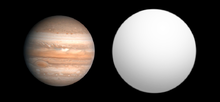XO-1b
extrasolar planet in the constellation Corona Borealis
XO-1b is an extrasolar planet. It is approximately 536 light years away. It was discovered in 2006 by the XO Project which is an international team of professional and amateur astronomers.[1] They used the transit method to find XO-1b. It a little bit larger than Jupiter. It is a hot Jupiter. The Hubble Space Telescope found water in the atmosphere of the XO-1b.[2][3]

References
change- ↑ McCullough, P. R.; Stys, J. E.; Valenti, Jeff A.; Johns-Krull, C. M.; Janes, K. A.; Heasley, J. N.; Bye, B. A.; Dodd, C.; Fleming, S. W. (2006-09-10). "A Transiting Planet of a Sun-like Star". The Astrophysical Journal. 648 (2): 1228–1238. arXiv:astro-ph/0605414. Bibcode:2006ApJ...648.1228M. doi:10.1086/505651. ISSN 0004-637X. S2CID 8100425.
- ↑ Garner, Rob (2015-05-06). "Hubble Traces Subtle Signals of Water on Hazy Worlds". NASA. Retrieved 2020-09-23.
- ↑ Deming, Drake; Wilkins, Ashlee; McCullough, Peter; Burrows, Adam; Fortney, Jonathan J.; Agol, Eric; Dobbs-Dixon, Ian; Madhusudhan, Nikku; Crouzet, Nicolas (2013-08-20). "INFRARED TRANSMISSION SPECTROSCOPY OF THE EXOPLANETS HD 209458b AND XO-1b USING THE WIDE FIELD CAMERA-3 ON THE HUBBLE SPACE TELESCOPE". The Astrophysical Journal. 774 (2): 95. arXiv:1302.1141. Bibcode:2013ApJ...774...95D. doi:10.1088/0004-637X/774/2/95. ISSN 0004-637X. S2CID 10960488.